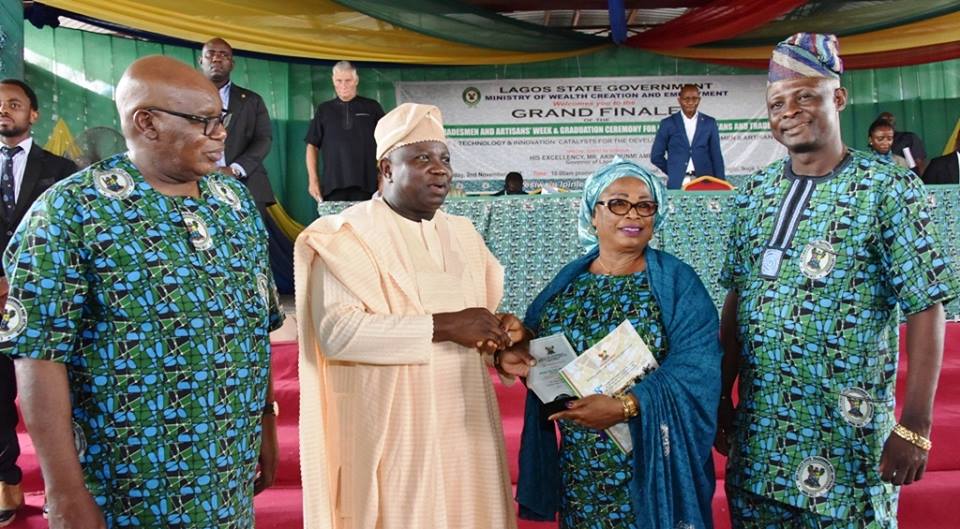Economy
Lagos to Officially Engage Traders, Artisans to Boost Economy

By Dipo Olowookere
Governor Akinwunmi Ambode of Lagos State has promised that government would now start to officially engage traders and artisans on jobs that would improve their economy.
Mr Ambode made this disclosure yesterday when he presented certificates to 1,500 artisans and traders in the state who were retrained on modular employability programme as part of efforts to scale up the informal sector with the view to making members meet up with current realities.
The beneficiaries drawn from various associations under the auspices of the Lagos State Council of Tradesmen and Artisans (LASCOTA) and were solely trained by the state government for enhanced productivity in a total of 24 trades including entrepreneurship, computer appreciation, writing business proposals, among others.
Speaking at the graduation ceremony and 8th Tradesmen and Artisans Day held at De Blue Roof, LTV 8 Compound in Ikeja, Governor Ambode said the role of artisans and traders in the pyramid of socio-economic development of the nation was very critical in achieving sustainable growth and overall prosperity of the people.
He said it was in recognition of such fact that his administration had shown commitment towards ensuring that the event was not only sustained eight years after, but also designed to be more rewarding.
Governor Ambode, who recalled various initiatives designed to scale up the informal sector such as the N25billion Employment Trust Fund (ETF), among others, assured traders and artisans in the State that government would continue to implement strategies and programmes to promote their businesses and create conducive environment for their operation.
He said, “Giving the strategic role of the informal sector in our economic development in this State, our administration has opened an online portal designed to facilitate interaction among artisans, customers/end-users and relevant stakeholders.
“It is our primary role to make it easy and convenient for people in need of high quality service to meet reliable, trusted and verifiable service providers. It is also aimed at enhancing the productivity, competitiveness, creativity and vitality of this sector.”
While expressing excitement with the fact that tailors from the state produced the academic gowns used for the graduation, the Governor, while speaking on specific requests made by LACOSTA, stated that, “As a start, we instruct the Ministry of Wealth Creation and Employment to see the capabilities and the opportunities that we can spread out from state jobs and contracts and give to our artisans.”
“I am very happy to note that we have graduates among you and also graduates who are also your children. So, we hereby create an immediate opportunity through your associations to be able to recruit into key areas in the public service where we can need your services. These are not political promises, we keep our promises and we will fulfil all our promises,” Governor Ambode said.
While congratulating the artisans and traders for successfully undergoing the training, the Governor urged them to put all they have learnt to effective practice, and leverage on the endless opportunities of the strategic position of Lagos as one of the fastest growing economies in the world to be solution providers, just as he assured that the State Government would continue to provide and maintain the required infrastructure and conducive environment for businesses to thrive.
Besides, Governor Ambode launched a compendium of artisans in the State to boost the informal sector, and also inaugurated operational bus donated to LACOSTA by the State Government.
Earlier, in his opening remarks, Commissioner for Wealth Creation and Employment, Mr Babatunde Durosinmi-Etti, said since the last edition of the event, Governor Ambode, as requested by LACOSTA, had already approved N12million annual subvention to the association and increased the number of beneficiaries in 2017 to 1500 from the 500 that were trained in 2016.
Also, LACOSTA President, Alhaji Nurudeen Buhari commended Governor Ambode for keeping his promise of scaling up the informal sector and prioritizing the interest of artisans and traders in the State. He said as promised by the Governor, many of their members have benefited from the ETF loan, among other fulfilled promises.
Economy
LIRS Urges Taxpayers to File Annual Returns Ahead of Deadline

By Modupe Gbadeyanka
All individual taxpayers in Lagos State have been advised to file their annual tax returns ahead of the March 31 deadline.
This appeal was made by the Lagos State Internal Revenue Service (LIRS) in a statement issued by its Head of Corporate Communications, Mrs Monsurat Amasa-Oyelude.
The notice quoted the chairman of LIRS, Mr Ayodele Subair, as saying that timely filing remains both a constitutional and statutory obligation as well as a civic responsibility.
The statutory filing requirement applies to all taxable persons, including self-employed individuals, business owners, professionals, persons in the informal sector, and employees under the Pay-As-You-Earn (PAYE) scheme.
In accordance with Section 24(f) of the 1999 Constitution of the Federal Republic of Nigeria, Sections 13 &14(3) of the Nigeria Tax Administration Act 2025 (NTAA), every individual with taxable income is required to submit a true and correct return of total income from all sources for the preceding year (January 1 to December 31, 2025) within 90 days of the commencement of a new assessment year.
“Filing of annual tax returns is not optional. It is a legal requirement under the Nigeria Tax Administration Act 2025. We encourage all Lagos residents earning taxable income to file early and accurately.
“Early and accurate filing not only ensures full adherence with statutory requirements, but supports effective monitoring and forecasting, which are critical to Lagos State’s fiscal planning and long-term sustainability,” Mr Subair stated.
He further noted that failure to file returns by the statutory deadline attracts administrative penalties, interest, and other enforcement measures as prescribed by law.
To enhance convenience and efficiency, all individual tax returns must be submitted electronically via the LIRS eTax portal at https://etax.lirs.net. The platform enables taxpayers to register, file returns, upload supporting documents, and manage their tax profiles securely from anywhere.
In keeping with global best practices, Mr Subair reiterated that LIRS continues to prioritise digital tax administration and taxpayer support services. He affirmed that the LIRS eTax platform is secure and accessible worldwide. Taxpayers requiring assistance may visit any of the LIRS offices or other channels.
Economy
NNPC Targets 230% LPG Supply Surge to 5MTPA Under Gas Master Plan 2026

By Adedapo Adesanya
The Nigerian National Petroleum Company (NNPC) Limited has said the Gas Master Plan 2026 targets over 230 per cent scale-up of Liquefied Petroleum Gas (LPG) supply from 1.5 million tonnes per annum (MTPA) to 5 MTPA this year.
The Executive Vice President for Gas, Power and New Energy at NNPC, Mr Olalekan Ogunleye, unveiled the strategic direction of the NNPC Gas Master Plan 2026, outlining an aggressive expansion drive to position Nigeria as a regional and global gas powerhouse.
Mr Ogunleye delivered the keynote address at the 2026 Lagos Energy Week, organised by the Society of Petroleum Engineers (SPE), where he detailed plans to accelerate gas development, deepen infrastructure and significantly scale domestic supply.
According to him, the Gas Master Plan targets a scale-up of LPG or cooking gas supply from 1.5 MTPA to 5 MTPA, alongside expanded feedstock for Mini-LNG and Compressed Natural Gas (CNG) projects.
“The NNPC Gas Master Plan 2026 is a blueprint to unlock Nigeria’s vast gas potential and translate it into tangible economic value,” Mr Ogunleye said.
He added that the strategy would also drive exponential growth in Gas-Based Industries, GBIs, strengthening local manufacturing, fertiliser production and power generation.
“Our renewed focus is on turning abundant gas resources into inclusive economic growth and improved quality of life for Nigerians,” he stated.
Mr Ogunleye said the plan aligns with the Federal Government’s Decade of Gas initiative and the presidential production targets of achieving 10 billion cubic feet per day by 2027 and 12 BCF/D by 2030.
Industry leaders at the event, including executives from Chevron Corporation, Esso Exploration and Production Nigeria Limited, Midwestern Oil and Gas Company Limited, Abuja Gas Processing Company and Shell Nigeria Gas, commended the plan and praised Ogunleye’s leadership in driving implementation excellence.
The new blueprint signals NNPC’s determination to anchor Nigeria’s energy transition on gas, leveraging infrastructure expansion and domestic utilisation to consolidate the country’s status as Africa’s largest gas reserve holder.
Economy
Shettima Blames CBN’s FX Intervention for Naira Depreciation

By Adedapo Adesanya
Vice President Kashim Shettima has attributed the Naira’s recent depreciation to the intervention of the Central Bank of Nigeria (CBN) in the foreign exchange (FX) market, stating that the currency could have strengthened to around N1,000 per Dollar within weeks if the apex bank had allowed market forces to prevail.
The local currency has dropped over N8.37 on the Dollar in the last week, as it closed at N1,355.37/$1 on Tuesday at the Nigerian Autonomous Foreign Exchange Market (NAFEM), after it went on a spree late last month and into the early weeks of February.
However, speaking on Tuesday at the Progressive Governors’ Forum (PGF), Renewed Hope Ambassadors Strategic Summit in Abuja, the Nigerian VP said the intervention was to ensure stability.
“In fact, if not for the interventions by the Central Bank of Nigeria yesterday, the 1,000 Naira to a Dollar we are going to attain in weeks, not in months. But for the purpose of market stability, the CBN generously intervened yesterday.
“So, for some of my friends, especially one of our party leaders who takes delight in stockpiling dollars, it is a wake-up call,” the vice president said.
He was alluding to CBN buying US Dollars from the market to slow down the rapid rise of the Naira.
Latest information showed that last week, the apex bank bought about $189.80 million to reduce excess Dollar supply and control how fast the Naira was gaining value.
The move was aimed at preventing foreign portfolio investors from exiting Nigeria’s fixed-income market, as large-scale sell-offs could heighten demand for US Dollars, intensify capital flight, and exert further pressure on the exchange rate.
Amid this, speaking after the 304th meeting of the monetary policy committee (MPC) of the CBN on Tuesday, Governor of the central bank, Mr Yemi Cardoso, said Nigeria’s gross external reserves have risen to $50.45 billion, the highest level in 13 years.
This strengthens the country’s foreign exchange buffers, enhances the apex bank’s capacity to defend the Naira when needed, and boosts investor confidence in the stability of the Nigerian FX market.
-

 Feature/OPED6 years ago
Feature/OPED6 years agoDavos was Different this year
-
Travel/Tourism10 years ago
Lagos Seals Western Lodge Hotel In Ikorodu
-

 Showbiz3 years ago
Showbiz3 years agoEstranged Lover Releases Videos of Empress Njamah Bathing
-

 Banking8 years ago
Banking8 years agoSort Codes of GTBank Branches in Nigeria
-

 Economy3 years ago
Economy3 years agoSubsidy Removal: CNG at N130 Per Litre Cheaper Than Petrol—IPMAN
-

 Banking3 years ago
Banking3 years agoSort Codes of UBA Branches in Nigeria
-

 Banking3 years ago
Banking3 years agoFirst Bank Announces Planned Downtime
-

 Sports3 years ago
Sports3 years agoHighest Paid Nigerian Footballer – How Much Do Nigerian Footballers Earn





















